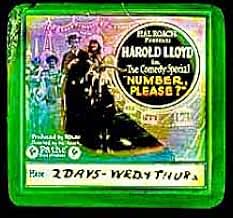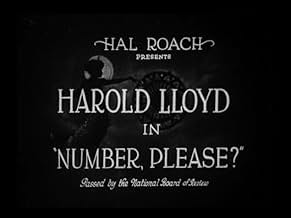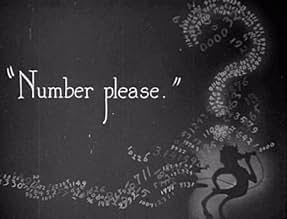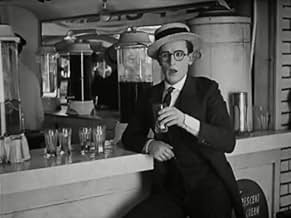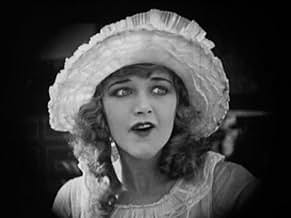NOTE IMDb
6,9/10
1,3 k
MA NOTE
Ajouter une intrigue dans votre langueWhile at an amusement park, two men try to win the heart of a young lady. They compete with each other while attempting to find her runaway dog, and they race to ask her mother's permission ... Tout lireWhile at an amusement park, two men try to win the heart of a young lady. They compete with each other while attempting to find her runaway dog, and they race to ask her mother's permission to take her up in a hot air balloon.While at an amusement park, two men try to win the heart of a young lady. They compete with each other while attempting to find her runaway dog, and they race to ask her mother's permission to take her up in a hot air balloon.
- Réalisation
- Scénario
- Casting principal
Sammy Brooks
- Little Man in Telephone Booth
- (non crédité)
William Gillespie
- Cop
- (non crédité)
Wally Howe
- Man on Rollercoaster
- (non crédité)
- …
Mark Jones
- Man on bench stealing purse
- (non crédité)
Gaylord Lloyd
- Man Managing Game Booth
- (non crédité)
Ernest Morrison
- Little Boy with Whisk Broom
- (non crédité)
Fred C. Newmeyer
- Carnival staff
- (non crédité)
Charles Stevenson
- Cop
- (non crédité)
- …
Lyle Tayo
- Gambler in Opening Montage
- (non crédité)
Noah Young
- Cowboy
- (non crédité)
Avis à la une
A Hal Roach HAROLD LLOYD Comedy Short.
A young fellow desperately tries to win back the affections of his ex-girlfriend during a madcap day at a seaside pleasure pier.
Silent screen genius Harold Lloyd has a wonderful showcase for his comedic talents in this extremely funny little film. Among the difficulties confronting Harold are a couple of contrary canines, several suspicious cops, a grossly incompetent telephone operator and a rapacious goat. The sequences involving the crazy mirrors, the phone booths and the small black boy are absolute gems.
Mildred Davis--his future real-life wife--is the object of Harold's affections. Stout Roy Brooks plays the determined Rival.
Robert Israel has composed an excellent film score which perfectly complements Harold's antics on the screen.
A young fellow desperately tries to win back the affections of his ex-girlfriend during a madcap day at a seaside pleasure pier.
Silent screen genius Harold Lloyd has a wonderful showcase for his comedic talents in this extremely funny little film. Among the difficulties confronting Harold are a couple of contrary canines, several suspicious cops, a grossly incompetent telephone operator and a rapacious goat. The sequences involving the crazy mirrors, the phone booths and the small black boy are absolute gems.
Mildred Davis--his future real-life wife--is the object of Harold's affections. Stout Roy Brooks plays the determined Rival.
Robert Israel has composed an excellent film score which perfectly complements Harold's antics on the screen.
Typical of many of the better silent slapstick comedies, 'Number, Please?' is a highly entertaining, charming, and, simply put, FUNNY short. The gags are aplenty, and many of them take full creative advantage of the setting and the circumstances of the central characters. This short takes place largely within the realms of an amusement park, and this leads to many rather interesting cinematic moments (ex.: a gag taking place on a roller coaster in which some of the footage was shot on an actual roller coaster while it was moving, the placement of the camera on a carousel for a few shots in another fast paced slapstick sequence). The timing, choreography, etc. are all done near perfectly. It is also worth noting that the ending of the short is surprisingly bleak, as is the entire overall story it tells. It is full on comical slapstick, but at its very core is a theme of heartbreak and failure. However, Harold Lloyd is able to deal w/this heartbreak and failure w/a self deprecating and highly amusing smile.
Funny Lloyd short is plenty on laughs as Lloyd goes to great limits to win the heart of a girl. Isn't that the basic plot of all the silent shorts from all the screen comics. There is the girl you have to the get and the laughs come from the approach. Today's comic have women in the movies but they are prizes that are given to the comic, not chased or earned in today's movies, id est the female love interest does not function as the macguffin which is the case in all the good silent comedies. That said, there are cops following Harold as he is acting very suspiciously for he is trying to dispose of a purse that he did not steal. As he tries to do this, making phone calls with a crying child, scenes on a rollercoaster all combine to deliver the laughs and finally, a bitter-sweet ending is the perfect coda to the futilities of the female hunt.
This middling Harold Lloyd short is neatly divided into three sections: concerning romantic rivalry at an amusement park, it starts off with a dog chase (this early part also involving a distorted mirror gag); the mid-section is devoted to the inventive telephone antics which give the film its title; the last part, then, resolves itself into a rather overstretched sequence in which Lloyd, chased by the police, tries to get rid of an incriminating purse.
Still, perhaps the single funniest bit occurs at the very beginning - a succession of title cards categorizing how various lovesick men deal with their predicament.
Still, perhaps the single funniest bit occurs at the very beginning - a succession of title cards categorizing how various lovesick men deal with their predicament.
This is a very good short comedy, with some good material and a fine job by Harold Lloyd as one of his slightly amoral but still sympathetic characters. Lloyd was as good as anyone was at taking a simple situation and building it up with as much comic material as he could fit into it without going too far. The telephone booth sequence here is a great example, and it is as impressive in its creativity as it is enjoyable to watch. The rest of "Number, Please" also works pretty well, and while there isn't much of a story to speak of, Lloyd is creative enough that you barely notice. Lloyd's style works well in this one, and it's a very entertaining feature.
Le saviez-vous
- AnecdotesThe amusement park featured is Pickering's Pleasure Pier / Ocean Park, Santa Monica, California, one of a few that existed on and nearby the property. It burned down in 1924. The most famous and popular, Pacific Ocean Park, or P.O.P., was eventually built on the site and opened in July 1958. It closed in 1967, and was demolished in the winter of 1974. Nothing remains other than a few underwater supports. The current Ocean Park on Santa Monica Pier is in a different location than Pickering's.
- GaffesAt one point, a telephone operator asks Harold, "What do you expect for a nickel ~ the White House?" But the title card in which she "speaks" this line shows the U.S. Capitol.
- Versions alternativesThe Harold Lloyd Trust renewed the copyright in 2004 of a 25-minute version of this film with music composed, arranged and conducted by Robert Israel, and played The Robert Israel Orchestra (Europe).
- ConnexionsFeatured in How Mirror Scenes Are Shot in Movies & TV (2022)
Meilleurs choix
Connectez-vous pour évaluer et suivre la liste de favoris afin de recevoir des recommandations personnalisées
Détails
- Durée25 minutes
- Couleur
- Mixage
- Rapport de forme
- 1.33 : 1
Contribuer à cette page
Suggérer une modification ou ajouter du contenu manquant

Lacune principale
By what name was Quel numéro demandez vous? (1920) officially released in Canada in English?
Répondre
